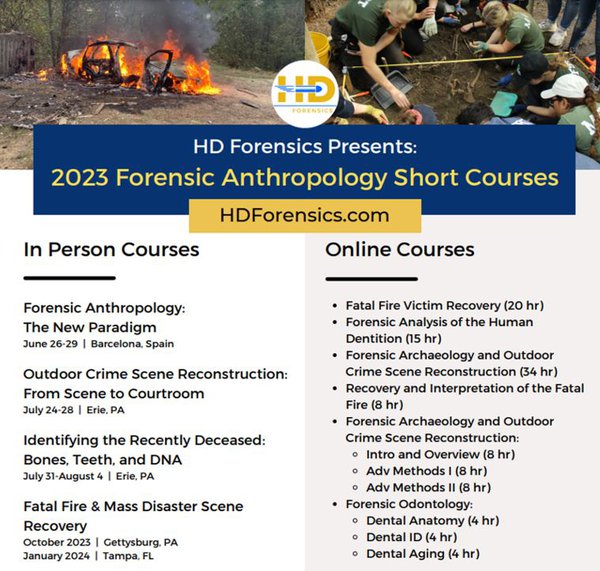
Submitted 14 June 2023 by Dennis Dirkmaat, Ph.D., D-ABFA

Identifying the Recently Deceased: Bones, Teeth and DNA
This week-long course will focus on methods and techniques used to establish positive identification in cases involving decomposing human remains found in a diversity of forensic contexts. The most common scientific modalities in use today will provide the focus of the course: fingerprints, dental, skeletal, and DNA, and from the perspectives of the medicolegal, law enforcement, and the forensic scientist communities. Topics to be discussed at length will include: state-of-the-field principles and methods utilized for obtaining accurate scientific human identifications through anthropological, odontological and genetic disciplines; obtaining fingerprints from the deceased in various stages of decomposition; reconstruction of the biological profile through osteological analyses; dental and osteological age estimation methods employed for juveniles and adults; human identification methods through genetic genealogy and phenotyping; and human identification in mass disaster operations. The course will consist of lectures, hands-on sessions, as well as forensic cases discussions.
July 31- Aug 4, 2023 | Erie, PA | Adserias-Garriga, Dirkmaat, R. Miller, Dunn, Melillo, Cabo, Young, Lench, W. Miller.
________________________________________________________________________________________________________________________________________
Outdoor Crime Scene Reconstruction: From Scene to Courtroom
This week-long course will focus on the management of the outdoor crime scene from a variety of outdoor contexts (surface-scattered, buried body, and fatal fire). The course will cover all of the important components of the forensic investigation: law enforcement/medicolegal hypotheses; outdoor crime scene recovery protocols (Forensic Archaeology); past events reconstruction (Forensic Taphonomy); creation of the Biological Profile; personal identification; interpretation of human skeletal trauma (Forensic Osteology); production of the forensic anthropology report; and eventually, presentation in court. The various topics will be presented through lectures and forensic case discussions. Extensive hands-on sessions will include use of state-of-the-field mapping equipment (total stations, survey-grade GPSs), scene scanners, human skeletal remains, bioprofile assessment, skeletal trauma practices, and hand-held Artec scanners use. July 24-28, 2023 | Erie, PA, | Dirkmaat, Hochrein, Adserias, Jester, Cabo.
Copyright © 2025 American Association of Biological Anthropologists.
Site programming and administration: Ed Hagen, Department of Anthropology, Washington State University